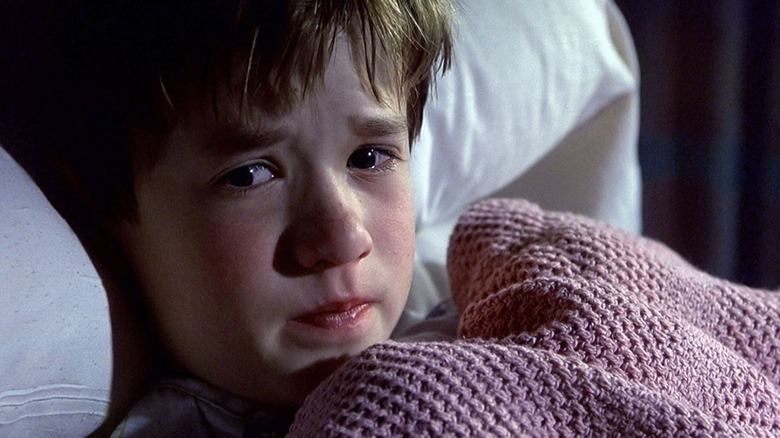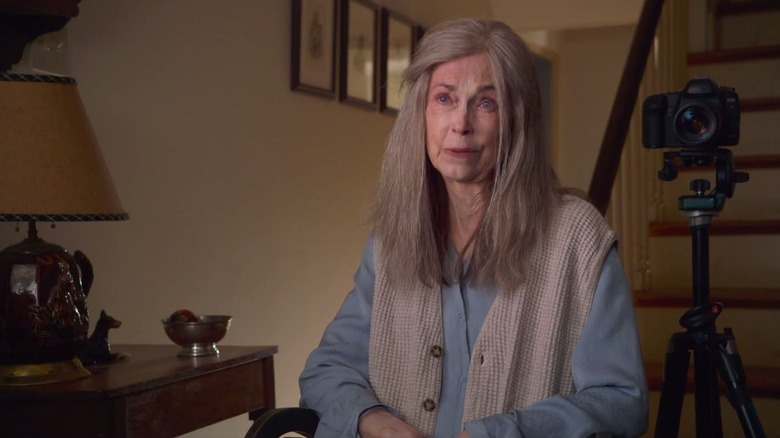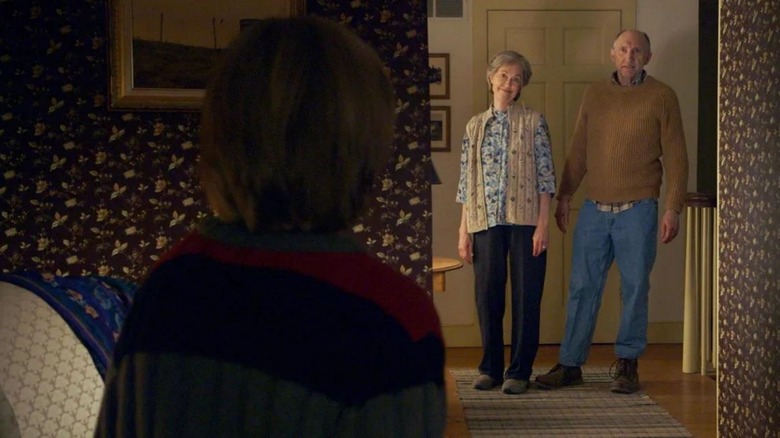M. Night Shyamalan Only Considers One Of His Films 'Real Horror'
Indian-American filmmaker M. Night Shyamalan gained international recognition in 1999 with "The Sixth Sense," which tells the story of a young boy who can see ghosts. Over the years, Shyamalan has achieved critical acclaim because his scripts effortlessly weave supernatural themes and unconventional tropes of horror into the mundanity of day-to-day life. The supernatural segments in his films are often employed as framing devices — with the intention of kindling a larger conversation. But that doesn't make his films any less scary.
Shyamalan's filmography mirrors his keen understanding of how the most ordinary sentiments can be made terrifying. In "The Sixth Sense," disbelief plagues Bruce Willis' character. In "Signs," it is the fear of the unknown, and in "Split," it is the strength of the human mind that makes it scary.
Despite Shyamalan being known for his stellar contribution to contemporary horror cinema — and often being hailed as a king of modern horror — the filmmaker only considers one of his films as "real horror." And no, it isn't a film about aliens or ghosts.
'The Visit' is the only real horror movie Shyamalan has made
In 2019, The filmmaker shared with Den of Geek and Bloody Disgusting that his found footage film "The Visit" is the "only real horror movie" he's ever made.
Although the filmmaker was there to talk about "Glass," a superhero thriller drama that combines his most famous characters from "Unbreakable" and "Split" into a comic-book sequel, the subject turned to horror. When asked if the film included horror elements, M. Night Shyamalan said only one of his movies fit into that genre:
"You know, I'm very careful about that. For me, my only real horror movie I've ever made — and even that was subversive — was 'The Visit.' For me, where I'm going, I am going to scare you. That's what my intention is with that, and that movie has a lot of humour in it."
It plays on your fears
Set up as a homemade documentary, "The Visit" tells the story of a brother and sister who are sent to visit their estranged grandparents at their remote Pennsylvania farm. The weeklong trip quickly turns into a horror movie situation after the kids discover their grandparents are a lot odder than they let on ... and they're involved in something deeply disturbing.
Starring Ed Oxenbould, Olivia DeJonge, Deanna Dunagan, Peter McRobbie, and Kathryn Hahn, the film is teeming with relentless scares and unnerving dialogue ("Would you mind getting inside the oven to clean it?"). But the comedic moments alleviate the heavy ones, and Shyamalan utilizes the fear of the unknown in a compelling way. "The Visit" operates on rather unconventional horror tropes, making the film deeply resonant with his vision as a filmmaker.
Shyamalan's other films have teetered on the edge of horror and thriller — "The Sixth Sense" features ghosts and some chilling sequences, after all — but it isn't scary enough for the filmmaker to consider it a horror film:
"Even The Sixth Sense is borderline horror and thriller, right on the edge, when none of the others are, really. I don't think anything else is horror that I've ever made. So there are very scary elements, and I love that, when I go scary, it's frightening. But I think the thriller mould can handle that. And it's really interesting in terms of the psychology, because thrillers are female-driven, and horror is young male-driven. And yet they're very close. [laughs] Isn't that wild?"
What M. Night Shyamalan loves about 'The Visit'
The filmmaker even told Bloody Disgusting that he had never considered any of his films, except for "The Visit," to be scary. Despite its level of dark comedy, that film was intended to "thrill and scare" from the beginning:
"I love scary movies. I never really considered my previous films as scary though... but 'The Visit'? Yeah! This is the one. The intention of the film is to thrill and scare. I mean, sure, with 'The Sixth Sense' and 'Signs,' there were some terrifying things about those films, but I would consider them more thrillers than horror films. Making 'The Visit' was a lot of fun, and that translates to the screen when you watch the movie. The weirdness of 'The Visit' is actually my favorite part. It's mischievous. When watching the flick with an audience, invariably people start reacting; they're like 'What the f***? What did I just see? What does that even mean?' The audience intuitively knows that they're being f****d with but in a very fun way. Pulling the rug out from the viewer and making them laugh and scream is what it's all about for me. I really got into the dark comedy aspects of 'The Visit.' The movie is just brimming with David Lynchian strangeness. I like it."
There's a fine line between a thriller and a horror flick — and Shyamalan understands that the unseen evokes a fear deeper than any special effect possibly can. So he utilizes senses beyond those we are capable of identifying, to achieve the fear factor. "The Visit," which doesn't feature ghosts or cross-examines life after death, probes the fear of growing old. It explores how knowledge and experience held by elderly people can sometimes extend into the realm of the unknown — of which we know nothing.
Perhaps, Shyamalan believes that "The Visit" is the only horror movie he has ever made because, unlike others, this film doesn't need to employ the help of jump scares to scare you. It plays on the fears you already have.



